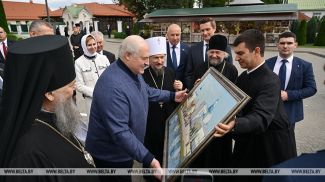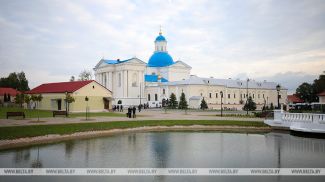MINSK, 29 September (BelTA) - The falsification of history is a real threat to the stability of society, Belarusian President Aleksandr Lukashenko said as he addressed the plenary session of the 7th Forum of Regions of Belarus and Russia in Minsk on 29 September, BelTA has learned.
“We cannot calmly observe the attempts of individual countries to rewrite history, diminish the feat of the Soviet people, and question the decisive contribution of the Soviet Union to the victory over Nazi Germany and its allies,” the Belarusian leader said.
He thanked Russian colleagues for the initiative in the Inter-Parliamentary Union to recognize the victory in World War II as the global heritage of mankind, and monuments to soldiers who fought against Nazism in all countries as the world memorial of humanity.
“The falsification of history is a real threat to the stability of society and carries risks of national, social, and religious divisions. It is therefore of the utmost importance that the forum discusses joint measures to counter the distortion of the truth about the war,” Aleksandr Lukashenko said.
He considers it necessary to work together to draft a new UN General Assembly resolution "Fighting the glorification of Nazism and the spread of Neo-Nazism and other practices that contribute to fuelling contemporary forms of racism, racial discrimination, xenophobia and related intolerance."
"But our efforts will be in vain if we do not pass the baton of remembrance over to the youth. Using the latest technologies, they try to impose false values on the younger generation: the cult of consumerism, individualism, social irresponsibility. This is alien to the traditions and worldview of our peoples whose values have been unity, cohesion and willingness to come to the aid of each other," Aleksandr Lukashenko noted.
The president noted that this work is under the most close attention of the Union State parliamentarians. The Youth Chamber at the Parliamentary Assembly of the Union State of Belarus and Russia actively involves young people in bilateral cooperation projects. "But this work needs to be made more specific, assertive and efficient," the Belarusian leader believes.













